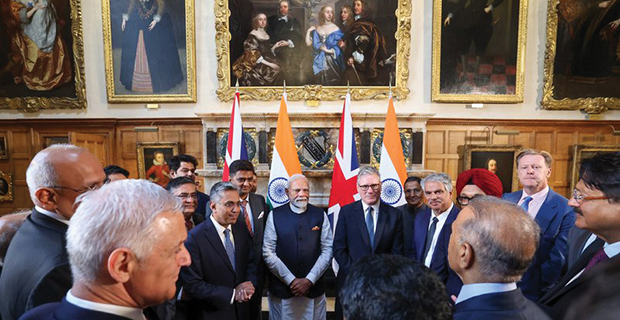Diaspora Diplomacy
PM Narendra Modi’s unique outreach to the Indian diaspora in the UK took root long before his premiership — and flourished with it.
New Delhi: As Prime Minister Narendra Modi arrived in London in July, he was greeted by thunderous chants of “Modi Modi,” “Bharat Mata ki Jai,” and “Vande Mataram” from the Indian community — a powerful reminder of a diplomatic tradition he had initiated decades before assuming India’s highest office.
This deepening emotional and strategic connection with the Indian diaspora has become a hallmark of India’s foreign policy under PM Modi, particularly during his second term. The roots of this engagement trace back to 1993, when Narendra Modi — then BJP General Secretary in Gujarat and a rising national figure — made an unplanned stop in the UK after visiting the United States.
Though brief and informal, Modi made it a point to engage with the Indian diaspora in the UK. He visited media outlets like Sunrise Radio and Gujarati weekly Naya Padkar, met with families in Croydon and Hastings, rode the London Underground, and conversed with everyday Indians living in Britain. “The seeds planted then would quietly nourish India’s diaspora diplomacy for decades to come,” the Modi Archive posted on X, sharing a timeline of Modi’s UK engagements.
By 1999, Modi had become a key national leader and BJP’s global voice. He returned to the UK in October for five days, shortly after the BJP’s resounding national election victory. Then National General Secretary, Modi had just led the BJP to win 20 of Gujarat’s 26 Lok Sabha seats and expanded the party’s rural base from 1,000 to over 16,000 village units between 1985 and 1995.
A highlight was his keynote address at Neasden’s Swaminarayan School, hosted by the Overseas Friends of BJP (UK). Despite the drizzle, the hall overflowed with enthusiastic supporters. Distinguished guests included Lord Navnit Dholakia, MP Barry Gardiner (Labour Friends of India), and Gujarat Samachar editor C.B. Patel. “BJP stands for nationalism and patriotism,” Modi said, according to the Modi Archive.
He expanded on India’s democratic traditions and the NDA’s development vision, paying tribute to Gandhian ideals. He framed BJP as a cultural and civilisational movement rooted in tradition, modernity, and democracy — asserting that India’s democratic ethos is admired worldwide. He was also honoured by the Lohana Mahajan community, where he praised overseas Indians as authentic ambassadors of Indian civilisation. During the same trip, he visited 10 Downing Street.
In September 2000, en route to the World Hindu Conference in the Caribbean and the UN Peace Summit in New York, Modi once again stopped in London. Then poised to become BJP General Secretary (Organisation), a rare and influential position, Modi met with British Deputy Prime Minister John Prescott and discussed regional security, political stability in Asia, and terrorism.











Comments.